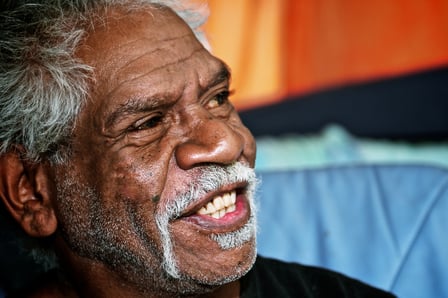In the heart of Australia’s remote outback, an Aboriginal elder, Patrick, sits on his front porch, chatting and laughing. He happily explains his upcoming plans for a holiday to his support worker, who nods along to the conversation. This Patrick, confident in making positive plans for his future, is very different to the Patrick CASPA first met.
Two years ago, Patrick suffered a stroke. The damage left him unable to walk and barely able to speak. Following the stroke, Patrick spent over a year in hospital, unable to rebuild his capacity and transition back into the community due to a lack of services in his remote location. He remained stuck in a system that couldn’t meet his needs, simply because of where he calls home.
In remote areas of Australia, this is the reality that many people face. And it could be getting worse.
Recent changes to NDIS pricing following the Federal Government’s 2025-2026 budget announcement have increased concerns about access to disability services in rural and remote regions. Cuts to travel claims and provider rates have already led some providers to withdraw from these communities entirely.
Without this access, people like Patrick remain stuck relying on hospital and care services that can’t help them reach their full capacity or rebuild their independence.
CASPA is dedicated to showing up for the people that need us in some of Australia’s most remote locations. We believe that when we provide wrap-around supports, we nurture healing, safety and protection. This leads to stronger, more resilient individuals and communities, which results in sustainable change for the future.
It was this commitment that meant CASPA was able to step in and help change the narrative for Patrick.
The first step was providing access to a supported living home and wrap-around therapeutic services. With the help of dedicated staff, Patrick was able to participate in physiotherapy and occupational therapy routines. From being unable to mobilise or clearly communicate just one year earlier, Patrick transitioned to being able to walk for two whole minutes. He’s chatting, laughing, and even planning a family getaway.
Through CASPA’s organisation of wrap-around supports and despite his remote location, Patrick has been able to not just survive but thrive. Because when presented with opportunity and provided with the right support, people like Patrick can achieve greater independence, reduced reliance on intensive services, and a better quality of life.


.png?width=448&name=Untitled%20design%20(20).png)
-1.png?width=448&name=Untitled%20design%20(13)-1.png)

.png?width=448&name=Untitled%20design%20(20).png)
-1.png?width=448&name=Untitled%20design%20(13)-1.png)
